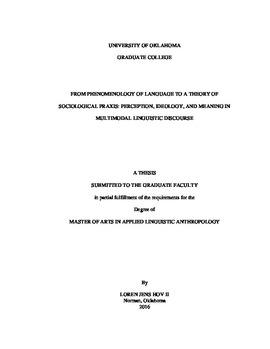| dc.contributor.advisor | O'Neill, Sean | |
| dc.contributor.author | Hov, Loren | |
| dc.date.accessioned | 2016-05-11T19:47:13Z | |
| dc.date.available | 2016-05-11T19:47:13Z | |
| dc.date.issued | 2016-05 | |
| dc.identifier.uri | https://hdl.handle.net/11244/34619 | |
| dc.description.abstract | Linguistics has prioritized the auditory mode of transmission in language at the expense of written forms and their relevance to the social construction of meaning and identity. Due to the privilege of spoken language as the least-mediated form of symbolic expression, the significant role non-verbal linguistic communication plays in social life is often overlooked. Through the perspectives of cognitive and perceptual forms of epistemology, written forms of language can and do influence reception to non-verbal utterance in a socially significant manner. Ideologies of language predispose linguistic and anthropological research against considerations of written linguistic artifacts and their roles in constituting ascribed social meaning. Signed forms of utterance are constrained by standardization and grammaticality, which in turn iconize and erase written language variation. When written variation is intentionally produced, it creates perceptually derived, ideologically charged responses that affect social attitudes and discourses. I address the methods and foci of sociolinguistic research for their pertinence to non-spoken language. I then analyze variation in written language in the domains of audiovisual animated media and African American dialect literature to show how socially significant responses to written variation create stratification by constructing fictive speech classes which are indexed to real speech communities. This investigation aims to clarify how modes of language transmission share properties assumed to be domain-specific, as well as to warrant a reexamination of the phonocentric concept of language in linguistic anthropology. As written forms of language are central to digital media, traditional sociolinguistic research must account for the written word just as it does the spoken. | en_US |
| dc.language | en_US | en_US |
| dc.subject | Language, Linguistics. | en_US |
| dc.subject | Anthropology, Cultural. | en_US |
| dc.subject | Discourse. | en_US |
| dc.subject | Dialect. | en_US |
| dc.subject | Ideology. | en_US |
| dc.title | FROM PHENOMENOLOGY OF LANGUAGE TO A THEORY OF SOCIOLOGICAL PRAXIS: PERCEPTION, IDEOLOGY, AND MEANING IN MULTIMODAL LINGUISTIC DISCOURSE | en_US |
| dc.contributor.committeeMember | Klein, Misha | |
| dc.contributor.committeeMember | Palmer, Gus | |
| dc.date.manuscript | 2016-05-11 | |
| dc.thesis.degree | Master of Arts in Applied Linguistic Anthropology | en_US |
| ou.group | College of Arts and Sciences::Department of Anthropology | en_US |
| shareok.nativefileaccess | restricted | en_US |
